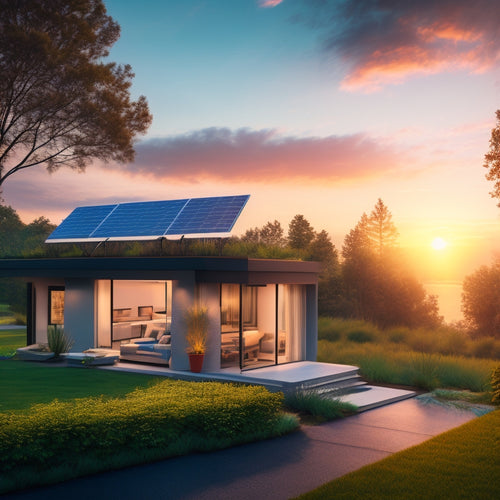
Maintain Your Energy System: A Homeowner's Schedule
Share
You're taking the first step towards a more energy-efficient home, and that starts with creating a personalized schedule to optimize your energy system. Conduct an energy audit to identify areas of inefficiency, then develop a customized plan to reduce waste and enhance your property's value. With real-time energy monitoring, you'll uncover hidden energy wasters and track your usage patterns to make data-driven decisions. Assess your energy usage with precise audit results, and implement daily energy habits that'll lead to cost savings. By following this roadmap, you'll be on your way to achieving a more sustainable, cost-effective energy system - and there's more to investigate in the details.
At a Glance
- Conduct quarterly energy audits to identify inefficiencies and optimize energy consumption patterns.
- Schedule bi-annual HVAC maintenance to ensure optimal performance and efficiency.
- Replace air filters monthly to improve indoor air quality and reduce energy waste.
- Review and adjust thermostat settings seasonally to minimize energy consumption.
- Monitor energy usage in real-time to identify hidden energy wasters and optimize daily habits.
Opt for Customized Energy Solutions
When you opt for customized energy solutions, you'll need to conduct an energy audit that identifies areas of inefficiency in your home.
This essential step helps you pinpoint opportunities for improvement, which are then used to inform your personalized system design.
By integrating solar panels, a charge controller, inverter, and battery storage into a single, compact unit, like an All in One Solar Power System, you can simplify the shift to renewable energy and guarantee a steady power supply.
Energy Audit Essentials
With energy consumption on the rise, conducting an energy audit is vital to identifying areas of inefficiency in your home. This process helps you pinpoint where energy is being wasted, allowing you to make focused improvements.
By conducting an energy audit, you'll reap energy audit benefits like reduced energy bills, increased comfort, and a smaller carbon footprint. Additionally, incorporating renewable energy systems for homes, such as home solar power, can further reduce your reliance on the grid. By leveraging these sustainable energy solutions, you can enjoy a more comfortable and energy-efficient living space.
You'll gain an extensive understanding of your home's energy usage. You'll identify areas where energy is being wasted, such as air leaks, inadequate insulation, and inefficient appliances.
With this knowledge, you can develop energy savings strategies customized to your home's specific needs. For instance, you might seal air leaks, upgrade to energy-efficient appliances, or add insulation to your attic.
Personalized System Design
You've taken the first step towards energy independence by identifying areas of inefficiency in your home through an energy audit. Now, it's time to design a unique energy system that addresses your distinct needs and goals.
This is where customized assessments come in, providing specialized solutions that optimize your energy usage. By considering Renewable Energy Bundles and off-grid solutions, you can create an all-encompassing energy system that reduces your reliance on the grid and minimizes your energy bills.
A unique system design takes into account your home's specific energy requirements, including factors like climate, insulation, and appliance efficiency. This information is used to create a detailed roadmap for improving your energy system, from upgrading lighting and insulation to installing renewable energy sources like solar or wind power.
With a customized design, you'll be able to prioritize energy-saving measures that make the most sense for your home and budget. You'll also gain a clear understanding of how each component of your energy system works together to reduce your reliance on the grid and minimize your energy bills.
Boosts Property Value Fast
You can considerably enhance your property's value by incorporating energy-efficient features, which not only appeal to environmentally conscious buyers but also reduce energy costs.
By investing in renewable energy systems, such as photovoltaic panels, you can increase your property's worth while reducing your carbon footprint.
With quick renovation tips, such as installing solar panels or energy-efficient appliances, you can increase your property's worth without breaking the bank.
Quick Renovation Tips
Renovating your home on a tight schedule requires strategic planning and execution. You need to prioritize tasks, allocate resources, and complete projects efficiently to maximize your property's value.
Start with kitchen upgrades, focusing on energy efficient appliances and smart thermostats that can greatly reduce energy consumption.
Next, tackle insulation improvements to minimize heat loss and gain. Consider DIY renovations to save time and money, but don't compromise on quality.
Exterior enhancements, such as landscaping choices, can enhance your property's curb appeal.
Improve indoor lighting to create a welcoming atmosphere.
Don't overlook ventilation systems, which play an essential role in maintaining a healthy and comfortable living space.
Increase Property Worth
Enhancing your property's value quickly requires a strategic focus on high-impact upgrades. By prioritizing the right property enhancements, you'll reap significant investment benefits.
Begin by identifying areas that need improvement, such as outdated fixtures, worn-out flooring, or inadequate lighting. Then, allocate your budget to tackle the most critical projects first.
Upgrading your home's exterior can instantly elevate its curb appeal. Consider replacing old siding, installing new gutters, or adding a fresh coat of paint.
Inside, focus on modernizing your kitchen and bathrooms with new appliances, countertops, and fixtures. These high-impact upgrades won't only increase your property's value but also enhance your living experience.
Energy Monitoring in Real-Time
You can monitor your energy usage in real-time to identify areas of inefficiency and optimize your energy system's performance.
By tracking your energy usage patterns, you'll be able to pinpoint hidden energy wasters and make adjustments to reduce your energy consumption.
With the help of solar powered battery backup systems off grid energy solutions, you can guarantee a reliable source of energy even during outages.
This level of understanding allows you to take control of your energy usage and make data-driven decisions to save energy and money.
Track Energy Usage Patterns
Your energy usage patterns hold the key to revealing significant savings on your utility bills. By tracking your energy usage in real-time, you'll gain beneficial knowledge into your daily energy consumption habits. This information will enable you to make informed decisions about your energy usage, allowing you to optimize your energy system for maximum efficiency.
To effectively track your energy usage patterns, you'll need to invest in a reliable energy tracking system. This system should be capable of providing detailed usage analysis, including the time of day and duration of energy usage.
With this data, you'll be able to identify areas of inefficiency and make adjustments to reduce your energy consumption. For instance, you may find that your energy usage peaks during certain hours of the day or that specific appliances are consuming more energy than necessary.
Identify Hidden Energy Wasters
Energy monitoring in real-time is the key to uncovering hidden energy wasters that could be driving up your utility bills. With real-time monitoring, you can identify areas where energy is being wasted and take corrective action.
You'll be able to detect issues like leaky windows, drafty doors, and outdated insulation that let heated or cooled air escape. Inefficient appliances, phantom loads, and standby power consumption from devices on standby mode can also be pinpointed.
Review your thermostat settings to verify they're optimized for your schedule. Consider upgrading to a smart thermostat for greater control.
Take a closer look at your lighting choices, switching to energy-efficient bulbs where possible. The age of your appliances also plays a role, so consider replacing old or inefficient ones.
Don't forget about HVAC maintenance, as a well-maintained system can greatly reduce energy consumption. By identifying and addressing these hidden energy wasters, you'll be able to slash your utility bills and enjoy the freedom that comes with energy independence.
Assess Your Energy Usage
You need to understand your energy consumption patterns to optimize your energy system schedule.
By analyzing your daily energy habits, you'll identify peak usage times and opportunities to reduce waste.
Consider investing in renewable energy systems that capture and store solar power solar energy storage systems to reduce your reliance on the grid.
Take a close look at your energy usage data to pinpoint areas where you can make adjustments and create a more efficient schedule.
Energy Consumption Patterns
About 30% of the average household's energy expenditures stem from inefficient energy usage patterns.
To optimize your energy system, it's crucial to understand your consumption patterns. You can identify peak consumption periods by analyzing your past energy bills, which typically occur during hot summer afternoons or cold winter mornings.
Usage trends also vary seasonally, with increased energy demand during winter and summer months.
Daily Energy Habits
This schedule helps identify opportunities to adjust daily habits and reduce energy waste. By tracking your daily routines, you'll become more aware of your energy consumption patterns and identify areas where you can make changes.
Start by monitoring your energy usage throughout the day, from the moment you wake up to when you go to bed. Take note of the appliances and devices you use, how long you use them, and their energy efficiency.
Implement energy saving tips into your daily routines, such as turning off lights and electronics when not in use, using power strips to plug in electronics, and adjusting your thermostat.
You can also optimize your daily routines by doing tasks that require energy-intensive appliances during off-peak hours or when the sun is out. By making these small adjustments, you'll be able to reduce your energy waste and save money on your energy bills.
Precise Energy Audit Results
You'll receive a detailed report outlining your energy efficiency scores, which will help you understand how your home performs with respect to energy consumption.
These scores will be based on factors such as insulation, window quality, and HVAC system performance.
Energy Efficiency Scores
Every homeowner receives a unique energy efficiency score based on their precise energy audit results, which serves as a benchmark for their energy consumption.
This score provides a clear illustration of your energy usage and identifies areas for improvement, helping you prioritize energy-efficient upgrades and sustainable practices.
Your energy efficiency score is typically measured on a scale from 0 to 100, with higher scores indicating better energy performance.
A score of 50, for instance, means your home is performing at the average energy efficiency level, while a score of 80 indicates your home is 30% more energy-efficient than the average.
Frequently Asked Questions
Can I Customize My Energy Plan to Fit My Budget?
You can tailor your energy plan to fit your budget by exploring flexibility options, such as tiered pricing, time-of-use rates, and budget-friendly choices, allowing you to optimize your energy costs without sacrificing your freedom.
Will Energy-Efficient Upgrades Increase My Insurance Costs?
As you illuminate your home with eco-friendly upgrades, don't let insurance costs darken your path; in fact, you'll likely qualify for insurance discounts, as energy efficiency is a guiding light of responsibility, shining bright in the eyes of insurers.
How Often Should I Have My Energy System Inspected?
You should have your energy system inspected annually, using an extensive inspection checklist to guarantee peak performance, identifying potential issues before they become major problems, and giving you peace of mind with your energy-efficient upgrades.
Are Energy Audits Only for Older Homes?
As you flip through your medieval wall hanging of home maintenance, you wonder: are energy audits only for older homes? Nope, you'll find energy audit benefits in any abode, enhancing home energy efficiency and freeing you from pricey utility bills.
Can I Perform an Energy Audit Myself?
You can perform a DIY energy audit, identifying areas of energy inefficiency and implementing energy saving tips like sealing air leaks and upgrading insulation, but be prepared to invest time and effort in the process.
Explore More
By following this schedule, you'll maintain your energy system and reap the benefits of customized energy solutions, increased property value, and real-time energy monitoring. Evaluating your energy usage and receiving precise audit results will enable you to make informed decisions. Did you know that, on average, homeowners who invest in energy-efficient upgrades see a 10% increase in their property's value? By prioritizing energy maintenance, you'll not only reduce your carbon footprint but also enhance your home's resale value.
Related Posts
-

Diy Off Grid Solar
By embracing DIY off-grid solar, you can break free from grid dependence, slashing your energy bills by up to 90% and...
-

The Future of Residential Energy Storage
The future of residential energy storage looks promising and cost-effective for you. With lithium-ion battery prices ...
-

Top Solar Powered Camping Fans for Camping Enthusiasts
If you're a camping enthusiast, a solar-powered fan can be a transformative element for your outdoor experience. Thes...


